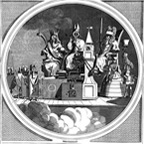This book, included in the «Publications of the Institute of Federalism, Fribourg, Switzerland», focuses on the Ethiopian federal model. The analysis of the role of the federal umpire in the Ethiopian federal structure is insightful due to its comparative perspective. The Ethiopian framework is compared with the classical federal model, or, as defined by eminent scholarship, the archetypes of the federal state: United States, Switzerland and Germany (Palermo & Kössler, 2017). It shall be acknowledged, primarily, that Ethiopia is not a pluralist democracy, as it does not acknowledge a multi-party system, given the dominant position of the Ethiopian People’s Revolutionary Democratic Front (hereinafter EPRDF). To this regard, the Author often highlights that the 1995 Ethiopian Constitution is the EPRDF Constitution. The Ethiopian Constitution-making processwas headed by the EPRDF (Fessha, 2010) and, currently, the party is still the pillar of the Ethiopian political system (Abebe 2014). Moreover, the analysis of all constitutional transplants in Africa shall take into consideration the social and religious context. This means ethnicism, tribalism and, ipso facto, African federal constitutions aiming at providing for ethnic accommodation. The only way to statehood is the “holding together federalism” (Stepan 1999) and, undoubtedly, Ethiopian ethnic federalism falls within this range of cases (Erk, 2016). The federal ethnic solution (Anderson, 2013) has been chosen by EPRDF in order to avoid the disintegration or the balkanization of the country (Fiseha, 2006).
This goal is clearly outlined in the well-known Preamble “We, the Nations, Nationalities and Peoples of Ethiopia…” relevant, among federal States, for its peculiar formulation, where ethnic diversity is emphasized. The Preamble sets out the aspiration of the constitutional text where the terminology is often recalled in its constitutional dispositions. Another cornerstone of the Ethiopian federal system is the inclusion of the secession clause among the catalogue of rights of “Nations, Nationalities, and Peoples” (hereinafter NNPs) (Art. 39 par. 1), which is considered, together with the principle of self-determination, “an unconditional right” (Abdullahi, 1998; Habtu, 2004). The House of the Federation (hereinafter HoF), which is vested with the power of judicial review, represents another core element of the Ethiopian federal system, which is still overlooked by scholarship. […]






